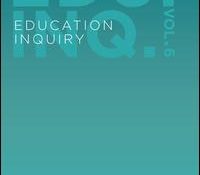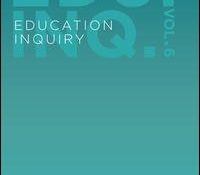tandfonline.com har udgivet en rapport under søgningen “Teacher Education Mathematics”: Student perspectives on assessment: connections between self and society Link til kilde
Like this:
Like Loading...
tandfonline.com har udgivet en rapport under søgningen “Teacher Education Mathematics”: High school student perspectives on flipped classroom learning Link til kilde
Like this:
Like Loading...
tandfonline.com har udgivet en rapport under søgningen “Teacher Education Mathematics”: ABSTRACT ABSTRACT In 2008, Iceland launched policy reform in upper secondary education. This paper elucidates how upper secondary school leaders acted when leading reform and confronting teacher responses. The study is based on interviews with 21 leaders from nine upper secondary schools. The data were analysed usingfive response categories to macro-level demands for change,institutional and organisational leadership, and theories on subject hierarchies. The findings show how the school leaders from the nine participating schools experienced differently the policy enactment in their schools. Seven of the nine schools matched three out of Coburn’s five response categories. Adding the category of pioneering would enable appropriate categorisation of new schools. Polarisation appeared in the data both between and within the evaluated schools. Within… Continue Reading →
Like this:
Like Loading...

tandfonline.com har udgivet en rapport under søgningen “Teacher Education Mathematics”: ABSTRACT ABSTRACT Motivated by earlier research highlighting Swedish teachers’ beliefs that the setting of homework compromises deep-seated principles of educational equity, this paper presents an exploratory study of Swedish parents’ perspectives on homework in their year-one children’s learning. Twenty-five parents, drawn from three demographically different schools in the Stockholm region, participated in semi-structured interviews. The interviews, broadly focused on how parents support their children’s learning and including questions about homework in general and mathematics homework in particular, were transcribed and data subjected to a constant comparison analytical process. This yielded four broad themes, highlighting considerable variation in how parents perceive the relationship between homework and educational equity. First, all parents spoke appreciatively of their children receiving reading homework and, in… Continue Reading →
Like this:
Like Loading...
tandfonline.com har udgivet en rapport under søgningen “Teacher Education Mathematics”: Abstract Educational disruption due to COVID-19 ushered in dramatically different learning realities in Ireland. Our research explored the experiences of children, young people and parents during the first period of ‘schooling at home’ (SAH) at the end of that academic year. An anonymous online survey, guided by social constructivist emphases, yielded responses from 2733 parents and 1189 students from primary and second-level schools. Substantial evidence emerged of parent-perceived and student-perceived negative psychosocial impacts of SAH on students. Further, our research clarified the exceptional stress experienced by parents in attempting to support SAH. A novel finding was student perceptions of having learned less during SAH, most likely due to significant declines in academic engagement. Recommendations for potential future periods of SAH… Continue Reading →
Like this:
Like Loading...
eric.ed.gov har udgivet: The author is an associate professor of animal studies at Colorado State University, but experienced learning difficulties in high school due to her place on the autism-Asperger’s spectrum. She had uneven skills, and while algebra was impossible, she did well in courses in which she could use her visual-thinking and associative-thinking skills. Her visual thinking skills enabled her to excel at her chosen career of designing livestock equipment. The author describes how visual thinkers like her are good at hands-on work. While she finds mathematical word problems to be difficult, she can conceptualize research experiments only if she has a concrete example such as a weight gain and different breeds of cattle. She cannot think about experimental designs in the abstract. Her success in her career ensued… Continue Reading →
Like this:
Like Loading...
eric.ed.gov har udgivet: This study was designed to help faculty and administrators weigh the value of using student ratings of professors’ teaching effectiveness and to determine factors that may affect those ratings. For this study, conducted at a Midwestern AACSB accredited School of Business, 163 students (23% of the business majors) were surveyed to determine their perceptions concerning student ratings of faculty. Although 100% of the students surveyed believed they were honest in their evaluations, only 33% of them believed other students were honest. International students tended to give higher evaluations in math-related classes than U.S. students. Students tended to give higher evaluations to professors who used humor and to professors they liked. They did not give higher evaluations to male professors or ones under 55 years of age. The… Continue Reading →
Like this:
Like Loading...
eric.ed.gov har udgivet: This presentation reports on the third phase of research associated with the Teacher as Decision Maker Program (TADMP), a graduate-level program for middle/secondary school certification at Indiana University. Seven teacher perspectives have emerged from the study of 86 individuals from the fields of science, English, foreign language, math, and social studies: (1) Scholar Psychologist; (2) Friendly Scholar; (3) Inculcator; (4) Facilitator of Thinking; (5) Friendly Pedagogue; (6) Empowerer, and (7) Nurturer. The latest research explores the utility of these teacher perspectives as a tool for strengthening self-reflection on teaching among TADMP students. The paper describes and analyzes the impact of four interventions based on the perspectives: (1) initial reflections; (2) choosing a center and gaining confidence; (3) reflecting back on perspectives and teaching; and (4) confirming and… Continue Reading →
Like this:
Like Loading...
eric.ed.gov har udgivet: On February 9, 2012, U.S. Secretary of Education Arne Duncan granted 10 states waivers of key accountability requirements of the Elementary and Secondary Education Act (ESEA), as amended by the No Child Left Behind (NCLB) Act. One year later, applications for this ESEA flexibility, also known as NCLB waivers, had been approved for an additional 24 states and the District of Columbia. States that receive waivers have the flexibility to depart from some of NCLB’s most significant requirements, such as judging school performance against a goal of 100% of students reaching reading and math “proficiency” by 2014 and implementing specific interventions in schools that fall short of performance targets. States with approved waiver applications must meet several new requirements, described below, that relate to standards and assessments,… Continue Reading →
Like this:
Like Loading...
eric.ed.gov har udgivet: The purpose of the study was to examine four questions concerning English Language Learners (ELLs). First, does English Language Learner status impact math scores? Second, does immigrant status favorably contribute to math achievement? Third, what math achievement is possible in other countries where there is multilingualism or high immigrant populations? Fourth, and most specifically, how can international exams help us address the issue of Latin American ELLs in Texas, who make up almost 15 percent of students? This article used data from the National Assessment of Educational Progress (NAEP) of 2008, the Program for International Student Assessment (PISA) of 2006, the Trends in International Mathematics and Science Study (TIMSS) of 2003, and the Texas Assessment of Knowledge and Skills (TAKS) to examine mathematics achievement of English Language… Continue Reading →
Like this:
Like Loading...




